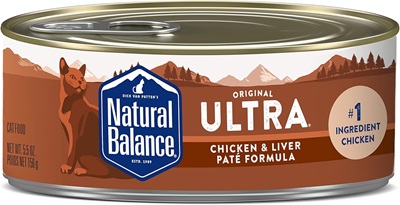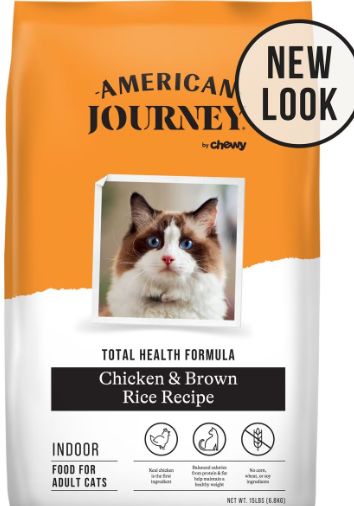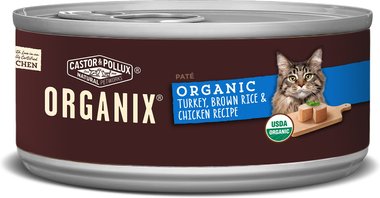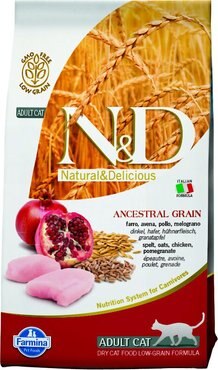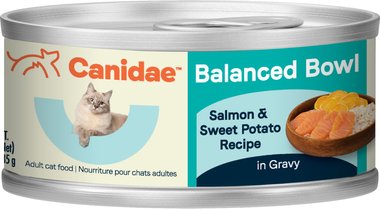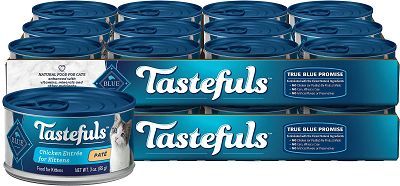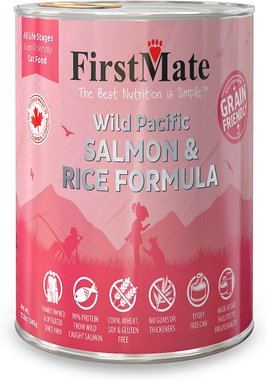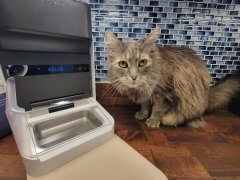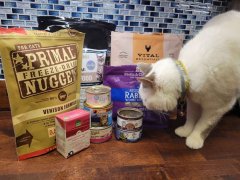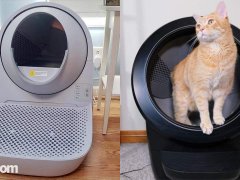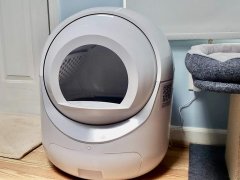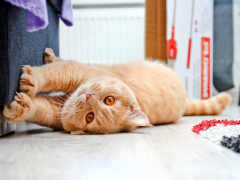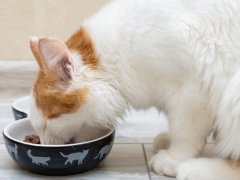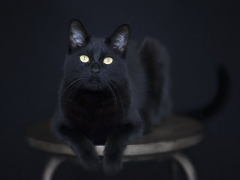The “grains in pet food” controversy is widespread, with experts weighing in both for and against carbohydrates in cat food. The truth is, we still have a lot to learn about the digestion and nutritional requirements of cats. As you stroll down the cat food aisle at your local pet store, you may find yourself asking, “Can cats eat grains?” Many brands boast grain-free, while others list a variety.
We’ve reviewed over 230 of the world’s most popular cat food brands and hundreds of formulas, spending hours researching, contacting pet food companies, and analyzing labels. And in this guide, we’re focusing on grains—whether your cat can and should be enjoying grains in their diet.
At a Glance: Best Grain-Inclusive Cat Food to Buy




Want a quick look at the products reviewed in this article? In the comparison table below, we’ve highlighted some of the most important features of each product. You’ll find more detailed information about each product later in the article.
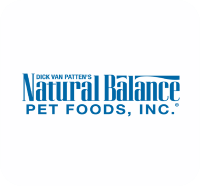
Natural Balance Ultra-Premium Chicken & Liver Pate Formula Canned Food
- Features a single source of high-quality animal protein
- Rich in animal-based omega-3s from menhaden oil
- Nutritious brown rice supplies fiber and essential nutrients
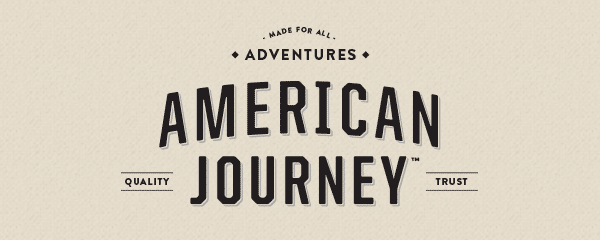
American Journey Indoor Cat Total Health Formula Chicken & Brown Rice Dry Cat Food
- Four sources of high-quality animal protein
- Contains nutritious brown rice and barley
- Affordably priced around $0.13 per ounce
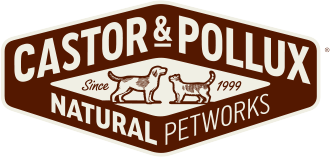
Castor Pollux Organix Organic Turkey, Brown Rice & Chicken Recipe Canned Cat Food
- Contains four sources of organic animal protein
- Organic brown rice is a nutritious source of fiber and energy
- Rich in moisture to support your cat’s hydration
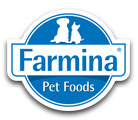
Farmina Natural & Delicious Chicken & Ancestral Low-Grain Formula Dry Cat Food
- Seven of the top ten ingredients are animal-based
- Contains two nutritious whole grains
- Primarily relies on animal fat from herring oil and chicken fat

Canidae Balanced Bowl Salmon & Sweet Potato Recipe in Gravy Cat Food
- Contains three sources of animal-based protein
- Sweet potato and brown rice supply nutrients and fiber
- Made with about 50% protein on a dry matter basis
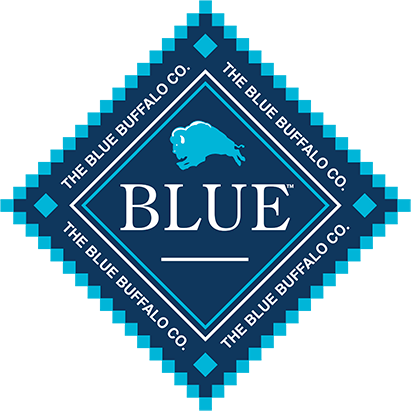
Blue Buffalo Tastefuls Chicken Entrée Kitten Pate Wet Cat Food
- Protein-packed and calorie-dense for growing kittens
- Rich in moisture to support your kitten’s hydration
- Contains nutrient-rich brown rice and sweet potatoes

FirstMate Wild Pacific Salmon & Rice Formula Canned Cat Food
- Features fresh salmon as the primary ingredient
- Very limited list of ingredients, highly digestible
- Free from fillers and artificial additives
Why Trust Cats.com
Over the past four years, I’ve personally tested over 100 different cat food products and have evaluated dozens of brands. I’ve also studied feline nutrition and have closely followed the controversy surrounding grain-free diets. I relied on my knowledge and experience to write this piece, balancing it with in-depth research and input from veterinary professionals.
In making my selections, I looked for meat-centric cat food products that align with the Cats.com standard. I prioritized whole-grain inclusions, avoiding products that rely heavily on refined grains or legumes. All of the products featured here have been tested by members of our team in a process fully funded by Cats.com with no direct influence by the brands.
The Best Grain-Inclusive Cat Foods on the Market
At the top of the list is a single-protein canned food formula from Natural Balance. Featuring fresh chicken and chicken liver, this recipe is balanced with nutritious brown rice and menhaden fish oil.
Can Cats Eat Grains?
A healthy human diet consists of lean proteins, fresh fruits and vegetables, and whole grains. But these dietary recommendations don’t directly translate for cats. Cats are, after all, obligate carnivores, while human beings are omnivores.
When it comes to the ideal feline diet, it’s all about animal products.
Your cat’s diet should be built on a foundation of animal-based proteins and fats. The diet should contain minimal carbohydrates because felines simply aren’t built to process plant foods as efficiently as animal products.
But does that mean that even nutrient-rich foods like whole grains are harmful to cats? Not necessarily. In fact, some veterinary nutritionists suggest carbs play an important role in a domestic feline diet.
It is largely undisputed that cats have no biological requirement for carbohydrates in their diet –their energy requirements can be met fully by consuming protein.
That being said, research suggests that cats can digest carbohydrates to absorb and use energy in the form of glucose, similar to other animals. In addition to providing a source of energy, carbohydrate metabolism produces the building blocks for other important nutrients like vitamin C and nonessential amino acids.
The belief that cats should be fed a meat-only diet stems largely from three ways in which the feline digestive system processes carbs:
- Cats have lower levels of carbohydrate-digesting enzymes in their intestines than are found in the intestines of omnivores, such as dogs (and humans).
- Cats don’t have glucokinase, a liver enzyme that converts glucose from carbs into a usable form of energy.
- Cats don’t have amylase in their saliva. Amylase is an enzyme that starts carbohydrate digestion.
While a cat’s digestive system may not look the same as a dog’s or work in the same way as a human’s, decades of research suggest that healthy carbohydrates like grains are a perfectly acceptable addition to a balanced feline diet.
What Does a Healthy Grain-Inclusive Diet Look Like?
Because cats are obligate carnivores, a meat-based diet will always be more species-appropriate (and generally more preferable) to your cat. Given the research summarized above, however, it’s worth considering the potential benefits of including digestible whole grains in your cat’s diet.
When it comes to carbohydrates in a domestic feline diet, balance is key.
We won’t dive too deep into the biology here, but while cats are able to digest carbohydrates similarly to other species, they seem to be less susceptible to hyperglycemia (high blood sugar) with regular consumption of carbohydrates. While humans—and dogs, to some degree—are prone to developing diabetes with high carbohydrate intake, cats may not be.
In fact, research published in the early 2000s determined that cats can adapt to varying levels of protein and carbohydrates in their diets as long as their minimum protein requirements are met. This science refutes the hypothesis that cats will start breaking down their own muscle for protein if fed a carbohydrate-inclusive diet.
In other words, as long as your cat’s diet contains a minimum of 26% protein on a dry matter basis (30% for kittens and pregnant/lactating females), there is no nutritional downside to including healthy carbohydrates like grains.
The key words here are “healthy carbohydrates.” While all grains contain carbohydrates, not all foods in the carbohydrate category are grains.
Whole grains like brown rice, whole oats, and barley are rich in fiber, vitamins, minerals, and essential fatty acids. They also contain some plant-based protein and are generally more digestible than processed grains. Processed grains like corn, wheat, and soy are commonly used as fillers in cat food and, in addition to being harder to digest, offer very limited nutritional value for cats.
When it comes to other carbohydrates in a feline diet, fresh fruits and vegetables can be nutritious. But you may want to think twice about recipes that make heavy use of legumes like beans, lentils, and peas. Legumes are commonly used as carbohydrate sources in grain-free diets.
Are Grains Linked To Dilated Cardiomyopathy?
The grain-free pet food trend really gained traction in the early 2000s following a wave of pet food recalls linked to contaminated grains sourced from China. Pet food manufacturers began using legumes like beans, peas, and lentils in place of grains like corn, wheat, and rice – a move that appealed to many health-conscious pet owners.
As grain-free diets started to take over pet store shelves, the assumption that grains are inherently bad for pets began to proliferate.
Pet parents around the world began switching their pets to grain-free diets. Over the course of the next decade, though, a new and troubling trend started to emerge. Between 2014 and 2019, the U.S. Food and Drug Administration (FDA) received over 500 reports of dilated cardiomyopathy (DCM) – a form of heart disease – in pets who had eaten a grain-free diet.
In 2018, the FDA announced that it had begun investigating these reports. Though the investigation is ongoing, there is some evidence linking certain diets to an increased risk for heart disease in dogs and, to a lesser degree, in cats.
The diets implicated in this link are bracketed as ‘BEG’ i.e. boutique, exotic, or grain-free – especially those that feature legumes, pulses (e.g., chickpeas, beans, lentils), or potatoes as the main ingredient.
Final Thoughts
As a cat owner, it’s your responsibility to make an informed decision regarding the best diet for your cat. We generally prefer meat-based, low-carb formulas that are balanced with animal-based fats. But, given the research discussed above, there’s no reason to exclude healthy grain-inclusive cat foods from your list of options.
Learn more about your cat’s nutritional needs in our complete guide.
Frequently Asked Questions
Should I be worried about my cat being allergic to grains?
The proliferation of grain-free diets has contributed to an increase in concern among pet owners about the potential dangers of grains for cats, namely grain allergies.
The truth is that food allergies are rare in cats and, when they do occur, they’re most commonly triggered by common proteins like chicken, beef, and eggs rather than carbohydrates like grains.
What’s better - a grain-free or grain-inclusive diet?
There’s no simple answer to this question. As long as your cat’s minimum requirements for protein are met, you have a lot of wiggle room to work with. Keep in mind, however, that the legumes frequently featured in grain-free cat foods have been linked to heart disease, though more study is needed in this area.
On the other side of the coin, a grain-inclusive diet featuring low-value grains like corn and wheat may be just as problematic.
What is the ideal carbohydrate content for commercial cat food?
Commercial cat foods contain an average of 20 to 40 percent carbohydrate. While we typically prefer meat-based cat foods that contain a maximum of 10% carbs, some research suggests that cats may actually choose higher-carb foods over high-protein foods.
This conclusion combined with the results of opposing studies suggest that it may ultimately come down to palatability - your individual cat’s preferences for flavor, protein type, and nutritional composition.
